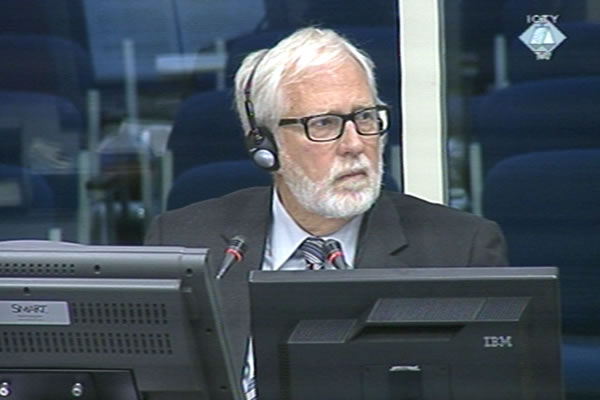Home
VIOLENCE AGAINST SARAJEVO A ‘PROPAGANDIST CARICATURE’
Although US historian Robert Donia does not deny that Sarajevo Serbs suffered violence during the war, he dismissed the allegations made by Mladic’s defense that Serbs were ‘hostages’ because they suffered violence and could not leave the city. Donia labels those claims a ‘propagandist caricature’
 Robert Donia, witness at the Ratko Mladic trial
Robert Donia, witness at the Ratko Mladic trial As Ratko Mladic’s defense counsel continues cross-examining US historian Robert Donia, he challenged the claim Donia made in one of his two expert reports, that Serbs in BH acted as separatists. Branko Lukic asked Donia how he could label as separatists those who advocated BH’s continued existence as part of Yugoslavia. As Donia explained, BH remaining part of a single state was the Bosnian Serb leadership’s first pick. Once BH declared independence, they changed tack and opted for another scenario: secession of those parts of BH they considered to belong to them, and their annexation to Serbia or Yugoslavia.
The defense put it to him that Serbs feared they would ‘lose the hallmarks of a nation’ and be outvoted by the Muslims and Croats; they would thus become a minority and would no longer be a constituent people. The witness said that the Bosnian Serb leadership ‘overestimated the cause for concern’ which was only partially justified.
For the most part, the defense focused on the US historian’s report on the siege of Sarajevo. Lukic put it to Donia that the Serbs’ position in the city was tragic and that they were in effect hostages, as they suffered violence and could not leave. They were used as ‘human shields’ in the fighting, forced to dig trenches for the BH Army, robbed and killed. Only the richest, those who could pay the bribes, could leave the city.
Although Donia did not deny that the Sarajevo Serbs did suffer some violence, he said that the picture painted by the defense was nothing but a ‘propagandist caricature’. As he explained, in the first few months of the war, the paramilitaries did take the citizens of Sarajevo, including Serbs, to dig trenches, but this practice stopped once the paramilitary units were placed under the control of the regular forces.Last week, Donia said that several hundred Serbs were killed in Sarajevo, but the figure was much lower than the 5,500 victims claimed by Mladic’s defense. Today he said that the Bosnian authorities did take some steps to control and prevent the departure of citizens from Sarajevo, but regardless of their ethnic background. As he explained, on the eve of the war about 100,000 Serbs lived in the part of the city that was to be besieged. By the end of the conflict, between 20,000 and 60,000 of them still lived in Sarajevo.
The defense put it to the witness that in some cases the Bosnian authorities deliberately obstructed gas, water and power supply to the city in order to paint a grimmer picture of the situation, and that the BH Army shelled civilian areas controlled by the Serb side. Donia agreed with the allegations. Very few questions dealt with the issues relevant for the allegations against General Mladic, who is on trial for the sniper and artillery terror campaign against the citizens of Sarajevo, and other crimes.
Robert Donia’s cross-examination will be completed tomorrow.Linked Reports
- Case : Mladic
- 2013-08-23 MLADIC’S TRIAL ADJOURNED TEMPORARILY
- 2013-08-22 DRINA RIVER WAS NOT TO BE THE BORDER
- 2013-08-21 ESCAPE FROM CERTAIN DEATH
- 2013-08-27 RATKO MLADIC’S ‘INFLUENTIAL VOICE’
- 2013-08-28 JUSTIFYING THE SHELLING OF SARAJEVO
- 2013-08-29 ‘INSANE’ THEORIES ABOUT CAUSE OF MARKALE EXPLOSION
